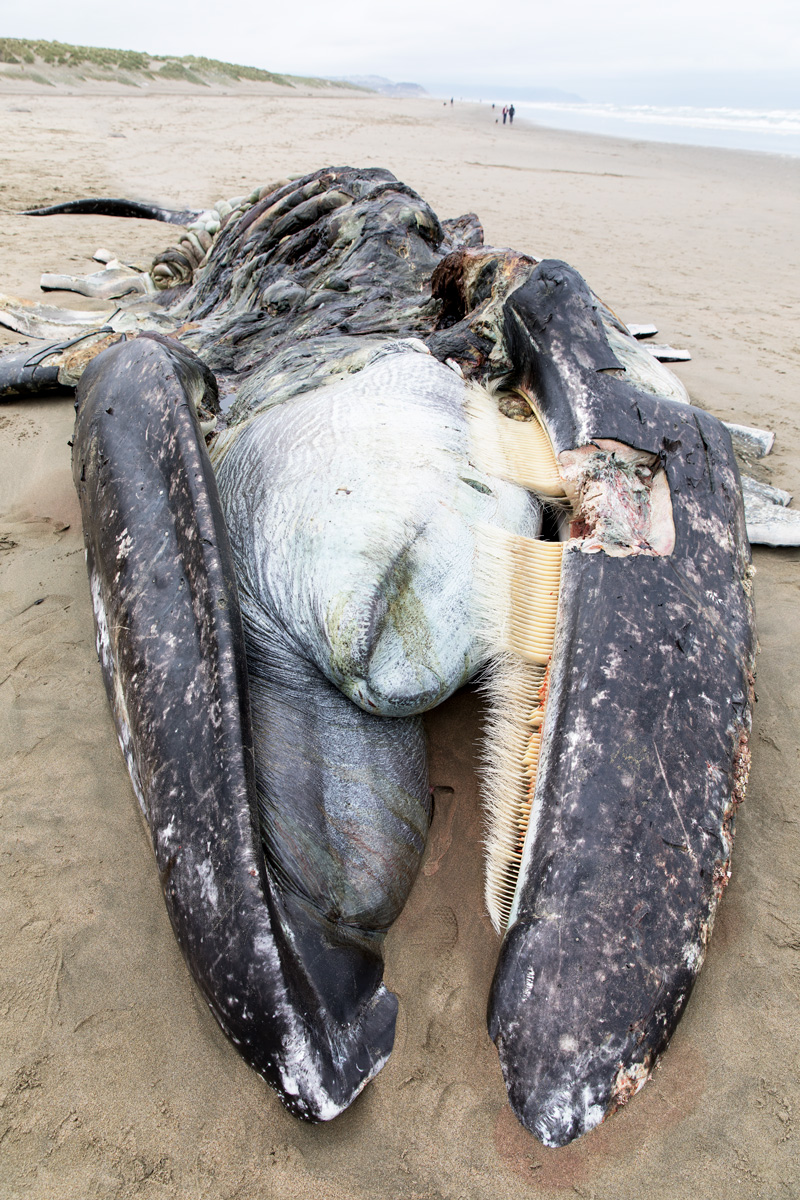Early Monday, May 6, a dead gray whale washed ashore at Ocean Beach in San Francisco. It was the ninth gray whale to have washed ashore in the San Francisco Bay Area this year.
The Marine Mammal Center, based in Sausalito, CA, has completed necropsies on the nine gray whales discovered so far in 2019. Four whales died due to ship strikes, and four were due to malnutrition. The cause of death for an eighth whale in Point Reyes National Seashore has not yet been determined. Blunt-force trauma from ship strikes, malnutrition and entanglements are the most common causes of death in whales The Marine Mammal Center’s research team has investigated.

A dead gray whale at Ocean Beach, CA. A necropsy was performed on Tuesday and determined the whale died after being struck by a ship.
Scientists at The Marine Mammal Center performed a necropsy early Tuesday morning, May 7, and confirmed the gray whale that stranded at Ocean Beach in San Francisco died from blunt force trauma attributed to a ship strike.
“We’re incredibly concerned to discover the death of four gray whales due to ship strikes already this year, along with deaths attributed to malnutrition,” says Dr. Padraig Duignan, Chief Research Pathologist at The Marine Mammal Center. “While this is a tragic discovery, the information gathered from these whales is shared directly with our partners, helping inform policy decisions that can protect habitat areas, change shipping lane speeds that intersect migration routes and better understand shifting food sources for marine mammals.”
During the necropsy, scientists discovered multiple fractures to the animal’s skull and upper vertebrae with significant bruising and hemorrhaging in the surrounding area consistent with blunt force trauma as a result of a ship strike. The Center’s scientists identified the gray whale as a 41-foot adult female that was in the early stages of decomposition based on the quality of the skin condition and internal tissues. The team also noted that the whale was in poor body condition with a thinner than usual blubber layer.
Whales and other marine mammals face numerous human-caused threats and solutions must be found to protect healthy and vulnerable species alike. The Marine Mammal Center is committed to partnering with organizations and individuals to provide data and find solutions to prevent these deaths in the future.
Biologists have observed gray whales in poor body condition during their annual migration this year potentially due to anomalous oceanographic conditions over the past few years that have contributed to shifting food sources. Increased numbers of gray whales have been sighted in the San Francisco Bay as the population continues their northerly migration this spring.
Climate change affects water temperatures and prey availability, leading to shifting food sources for marine mammal populations and other marine species. Overfishing can also lead to reduced prey availability. Effective policies are critical to protect vulnerable marine mammal populations from the many human-caused threats they face in the wild.
“As gray whale migration season enters its final stages of the season, adult female gray whales and their calves with low body reserves are the last to migrate northward to their feeding grounds in the Arctic,” said Dr. Duignan. “These mother whales are worn out and running on empty, making them even more susceptible to negative human interactions, including ship strikes and entanglements.”
The necropsy was completed Tuesday morning by scientists from The Marine Mammal Center and its partners at California Academy of Sciences. More than a dozen interns and students from around the world participated in the investigation to learn more about marine mammal health. The Marine Mammal Center collected tissue samples to contribute to baseline data and various research studies. The California Academy of Sciences archived the whale’s pelvic bones and baleen for their archive collection.
The Marine Mammal Center’s rescue team first received reports from members of the public of this dead whale early Monday morning. The Center has responded to more than 80 gray whales in its 44-year history.
Officials at Golden Gate National Recreation Area (GGNRA) are working through plans for future disposal of the whale’s remains at Ocean Beach. The GGRNA advises that members of the public and their pets to keep a safe distance from the whale as tidal conditions may cause the whale to move from its current location.
SAN FRANCISCO BAY AREA – 2019 GRAY WHALE NECROPSY RESULTS:
March 10, 2019: San Francisco Bay; Cause of death: malnutrition
March 11, 2019: San Francisco Bay; Cause of death: malnutrition
April 02, 2019: Rodeo, CA; Cause of death: malnutrition
April 10, 2019: San Mateo, CA; Cause of death: ship strike
April 13, 2019: Richmond, CA; Cause of death: suspected ship strike
April 13, 2019: Hercules CA; Cause of death: malnutrition
April 16, 2019: Pacifica, CA; Cause of death: ship strike
April 30, 2019: Point Reyes National Seashore; Cause of death: pending investigation results
May 6, 2019: San Francisco, CA; Cause of death: ship strike

